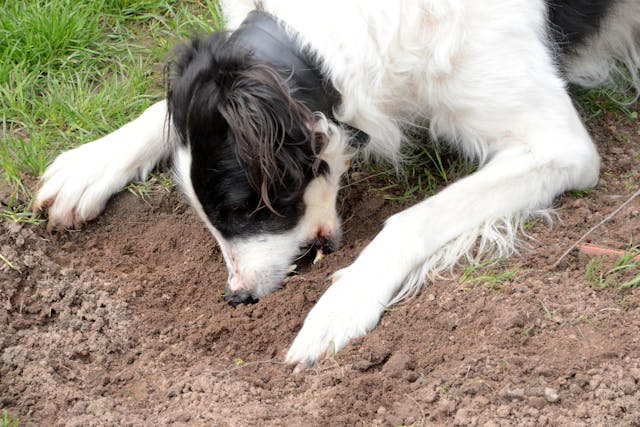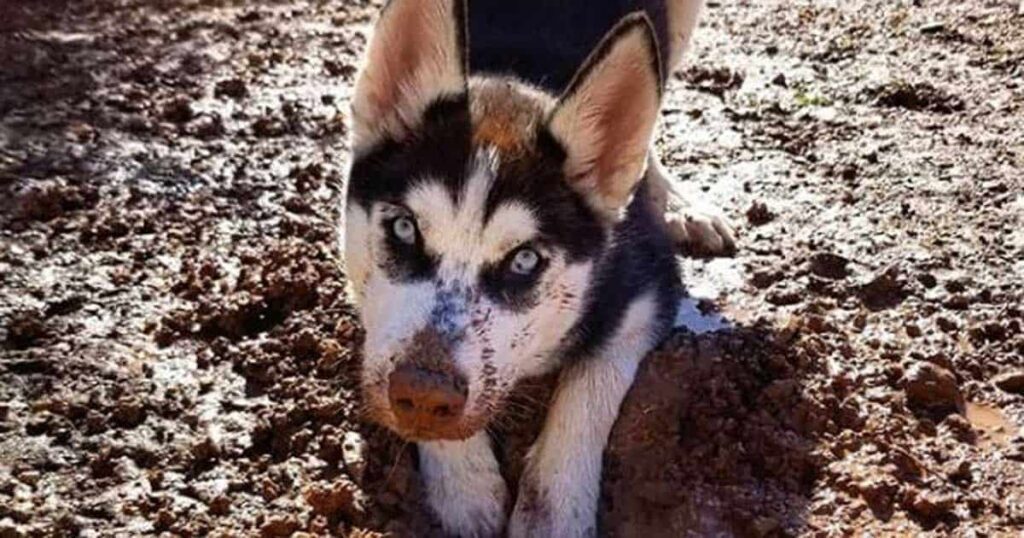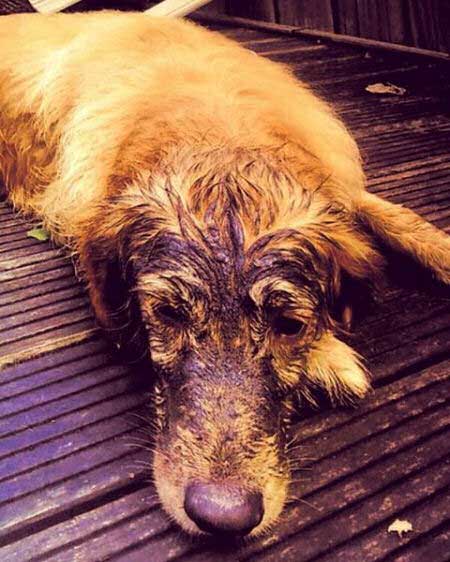

As the human parent of a canine, you have, in all likelihood, often asked yourself, “Why did my dog just eat that?” Dogs are, by nature, inquisitive beings and tend to “investigate” things first with their noses and mouths. While this is normal, the habitual consumption of non-food items is classified as an eating disorder called pica. In this month’s blog, we’ll look at a specific form of pica, called geophagia, which causes dogs to specifically eat dirt or mud, and how this habit can affect your dog’s health.
Nutritional, behavioural or medical factors generally cause the urge to eat soil.
Nutritional Deficiency
While every commercial we see for pet food promises that the product is the “very best for your best friend”, not all diets are equal. Your vet is the best person to advise you on which pet food contains all the minerals and nutrients your companion animal requires for his or her life stage and activity level. While the old adage, “You get what you pay for”, certainly applies, there are veterinarian-endorsed diets to suit most budgets. Investing in a high-quality, complete and balanced diet is one of the primary ways a pet parent can ensure their furry (or feathery or scaly) family member’s health and well-being. Please feel free to ask a CVC team member for assistance in selecting a diet for your pet that will support all his/her nutritional needs.
Dietary deficiencies may cause dogs to eat dirt to obtain minerals like iron, sodium and calcium from the soil. Underfed dogs will also eat dirt and other objects to stave off hunger pangs and gain some nutritional benefits.
Behavioural Issue
Dogs not provided with adequate exercise and an enriching environment quickly get bored, and some may eat dirt to keep themselves busy. Dogs suffering from separation anxiety or other stress disorders may eat dirt or display other stress behaviours like digging, self-harming, or vocalising to express their distress at being separated from their humans.
Medical Issues
A number of medical conditions can also cause dogs to eat soil. Examples of these are:
- Anaemia – often associated with hookworms, flea infestation, tick-borne diseases, cancer, immune-mediated diseases or bleeding disorders.
- Portosystemic shunt – an abnormal blood vessel that allows blood to bypass a dog’s liver and results in the organ receiving inadequate blood supply and malfunctioning.
- Gastritis (inflammation of the stomach) – when dogs have a tummy upset, they may eat dirt or grass to make themselves vomit.


Is It Bad For Dogs To Eat Dirt?
While occasionally eating small amounts of soil isn’t likely harmful, this should always be discouraged. A number of very real dangers can result if dogs regularly eat soil:
Gastrointestinal obstruction:
Soil is not food and cannot be broken down effectively by the body. It may also contain any number of foreign bodies that can get stuck in a dog’s throat, oesophagus, stomach or intestines (think stones, sticks, bones, kids’ toys, and pieces of metal….). Often the only intervention in the case of foreign body ingestion is surgery.
Damage to the teeth and intestinal tract:
Even if surgery isn’t required, you can imagine the potential damage that sharp stones, sticks or bones eaten in a mouthful of soil can do to a dog’s teeth and gastrointestinal tract as they make their way down to finally be excreted in faeces. A horrible blockage often occurs in the rectum, requiring veterinary treatment to move it out.
Toxins:
Another risk associated with eating dirt or grass is that your dog may swallow pesticides, fertilisers or other poisons that may be dangerous or even fatal.
Parasites:
Dogs who eat dirt are also more prone to picking up soil-dwelling parasites like giardia, hookworm, roundworm and whipworm. They may also swallow fleas which, in turn, transmit tapeworm.
If your dog suddenly starts eating dirt when he hasn’t done so before, this could indicate an underlying medical condition. He should be checked out by a vet, particularly if he’s showing any of the following symptoms as well:
- Decreased appetite
- Pale gums (indicates anaemia)
- Lethargy
- Straining or irregular bowel movements
- Vomiting multiple times in a 24hr period, especially if this happens soon after eating or drinking


So, How Do I Stop My Dog From Eating Dirt?
The five most effective ways to ensure that your dog does not eat dirt are:
- Feed a complete and balanced, veterinary-recommended diet – to ensure that all your furry friend’s nutritional needs are met.
- Feed smaller meals more often – dogs who only eat once per day may get hungry between meals, so divide the total recommended daily allowance for his or her age and size into two or three smaller meals.
- Walk your dog on a lead – keeping dogs under your direct supervision while walking can help prevent them from swallowing anything unusual. You can also walk your dog in a basket muzzle, which fits loosely over the mouth and will prevent ingesting dirt or other foreign objects.
- Prevent parasites – year-round, keeping your companion on an effective parasite-prevention programme will protect them from intestinal parasites, fleas, ticks and heartworm disease.
- Minimise boredom and anxiety – ensure that your dog always has plenty of toys and activities to indulge in and gets regular exercise and stimulation (ideally in the form of a walk outside the property). If your dog suffers from severe anxiety, seek advice from your vet and/or a certified animal behaviourist – these professionals will often work together to provide a two-pronged approach in the form of both medication and practical actions to alleviate the causes.
The odd mouthful of dirt nabbed while his human parent is digging out a new flowerbed is unlikely to cause Rex any lasting health problems. But if your dog suddenly starts eating soil or other foreign material or does so regularly or habitually, please chat with us; we’d be happy to help.
